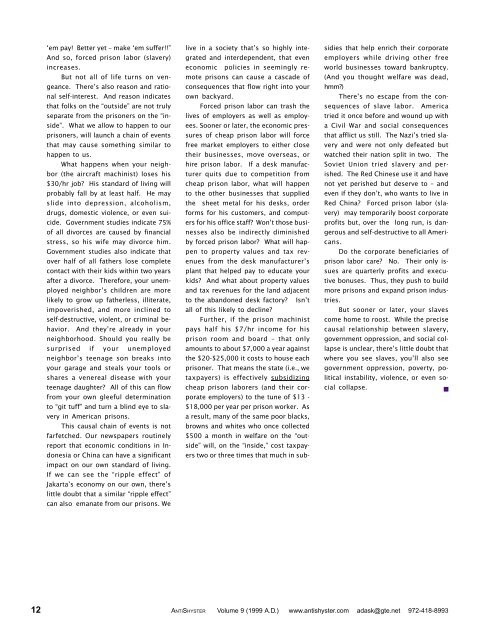Volume 9 No. 2 - Adask's law
Volume 9 No. 2 - Adask's law
Volume 9 No. 2 - Adask's law
Create successful ePaper yourself
Turn your PDF publications into a flip-book with our unique Google optimized e-Paper software.
‘em pay! Better yet – make ‘em suffer!!”<br />
And so, forced prison labor (slavery)<br />
increases.<br />
But not all of life turns on vengeance.<br />
There’s also reason and rational<br />
self-interest. And reason indicates<br />
that folks on the “outside” are not truly<br />
separate from the prisoners on the “inside”.<br />
What we allow to happen to our<br />
prisoners, will launch a chain of events<br />
that may cause something similar to<br />
happen to us.<br />
What happens when your neighbor<br />
(the aircraft machinist) loses his<br />
$30/hr job? His standard of living will<br />
probably fall by at least half. He may<br />
slide into depression, alcoholism,<br />
drugs, domestic violence, or even suicide.<br />
Government studies indicate 75%<br />
of all divorces are caused by financial<br />
stress, so his wife may divorce him.<br />
Government studies also indicate that<br />
over half of all fathers lose complete<br />
contact with their kids within two years<br />
after a divorce. Therefore, your unemployed<br />
neighbor’s children are more<br />
likely to grow up fatherless, illiterate,<br />
impoverished, and more inclined to<br />
self-destructive, violent, or criminal behavior.<br />
And they’re already in your<br />
neighborhood. Should you really be<br />
surprised if your unemployed<br />
neighbor’s teenage son breaks into<br />
your garage and steals your tools or<br />
shares a venereal disease with your<br />
teenage daughter? All of this can flow<br />
from your own gleeful determination<br />
to “git tuff” and turn a blind eye to slavery<br />
in American prisons.<br />
This causal chain of events is not<br />
farfetched. Our newspapers routinely<br />
report that economic conditions in Indonesia<br />
or China can have a significant<br />
impact on our own standard of living.<br />
If we can see the “ripple effect” of<br />
Jakarta’s economy on our own, there’s<br />
little doubt that a similar “ripple effect”<br />
can also emanate from our prisons. We<br />
live in a society that’s so highly integrated<br />
and interdependent, that even<br />
economic policies in seemingly remote<br />
prisons can cause a cascade of<br />
consequences that flow right into your<br />
own backyard.<br />
Forced prison labor can trash the<br />
lives of employers as well as employees.<br />
Sooner or later, the economic pressures<br />
of cheap prison labor will force<br />
free market employers to either close<br />
their businesses, move overseas, or<br />
hire prison labor. If a desk manufacturer<br />
quits due to competition from<br />
cheap prison labor, what will happen<br />
to the other businesses that supplied<br />
the sheet metal for his desks, order<br />
forms for his customers, and computers<br />
for his office staff? Won’t those businesses<br />
also be indirectly diminished<br />
by forced prison labor? What will happen<br />
to property values and tax revenues<br />
from the desk manufacturer’s<br />
plant that helped pay to educate your<br />
kids? And what about property values<br />
and tax revenues for the land adjacent<br />
to the abandoned desk factory? Isn’t<br />
all of this likely to decline?<br />
Further, if the prison machinist<br />
pays half his $7/hr income for his<br />
prison room and board – that only<br />
amounts to about $7,000 a year against<br />
the $20-$25,000 it costs to house each<br />
prisoner. That means the state (i.e., we<br />
taxpayers) is effectively subsidizing<br />
cheap prison laborers (and their corporate<br />
employers) to the tune of $13 -<br />
$18,000 per year per prison worker. As<br />
a result, many of the same poor blacks,<br />
browns and whites who once collected<br />
$500 a month in welfare on the “outside”<br />
will, on the “inside,” cost taxpayers<br />
two or three times that much in sub-<br />
sidies that help enrich their corporate<br />
employers while driving other free<br />
world businesses toward bankruptcy.<br />
(And you thought welfare was dead,<br />
hmm?)<br />
There’s no escape from the consequences<br />
of slave labor. America<br />
tried it once before and wound up with<br />
a Civil War and social consequences<br />
that afflict us still. The Nazi’s tried slavery<br />
and were not only defeated but<br />
watched their nation split in two. The<br />
Soviet Union tried slavery and perished.<br />
The Red Chinese use it and have<br />
not yet perished but deserve to – and<br />
even if they don’t, who wants to live in<br />
Red China? Forced prison labor (slavery)<br />
may temporarily boost corporate<br />
profits but, over the long run, is dangerous<br />
and self-destructive to all Americans.<br />
Do the corporate beneficiaries of<br />
prison labor care? <strong>No</strong>. Their only issues<br />
are quarterly profits and executive<br />
bonuses. Thus, they push to build<br />
more prisons and expand prison industries.<br />
But sooner or later, your slaves<br />
come home to roost. While the precise<br />
causal relationship between slavery,<br />
government oppression, and social collapse<br />
is unclear, there’s little doubt that<br />
where you see slaves, you’ll also see<br />
government oppression, poverty, political<br />
instability, violence, or even social<br />
collapse.<br />
12 ANTISHYSTER <strong>Volume</strong> 9 (1999 A.D.) www.antishyster.com adask@gte.net 972-418-8993


